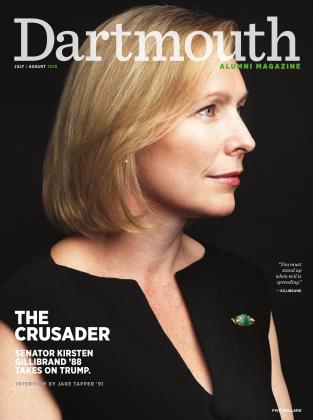Freedom Fighter
Prisoner reformer has ambitions aims.
JULY | AUGUST 2018 ISHAAN H. JAJODIA ’20Prisoner reformer has ambitions aims.
JULY | AUGUST 2018 ISHAAN H. JAJODIA ’20Janos Marton ’04 wants prison reform now—and in a big way. As director of policy and campaigns at Just Leadership USA (JLUSA), Marton has a startling goal—to halve the U.S. correctional population by 2030.
“There are too many Americans in prison, and on average people in prison are serving some of the longest sentences in the world. This has led to entire communities being ripped apart,” says Marton. “These policies do not serve public safety. A model that invests in communities, particularly education, health, and economic opportunity, would not only better support individuals but lead to much better results for our country in the long run.”
JLUSA worked closely with New York City Mayor Bill DeBlasio, who campaigned on a promise to close the aging, overcrowded Rikers Island jail complex that houses nearly 9,000 prisoners. Before joining JLUSA, Marton ran programs for Rikers’ teenage inmates. It was fitting that he and his team managed the #CLOSErikers cam paign on DeBlasio's be half. In a major triumph for the mayor, DeBlasio last year announced a $10.6-billion plan to raduallv close Rikers over a 10-year period. New, smaller jails are planned in each of the city’s boroughs, and other correctional facilities will be retrofitted to accommodate Rikers’ prisoners.
Marton, who leads a team of 25 and manages a budget of $6.5 million, plans to take lessons learned with the Rikers campaign and test them in four states. He faces a significant challenge. “The American psyche is very heavy on punitive retribution, and that bleeds into every step of our criminal justice system,” he says. The New York City-based attorney isn’t easily deterred. In previous activism efforts he served as special counsel on the Moreland Commission to Investigate Public Corruption, which exposed widespread wrongdoing in New York’s campaign finance and lobbying systems, and ran operations for Hands on Disaster Response in Biloxi, Mississippi, after Hurricane Katrina.
Marton pulls few punches: “Young people should not receive adult sentences. The ‘War on Drugs’ must be completely disbanded, and all people in prison, regardless of their crimes, should receive shorter sentences. We need a change of attitude amongpolitical stakeholders about what ending mass incarceration looks like. It can’t just be about non-violent drug offenses.” He also wants to dramatically limit pre-trial detention, arguing it subverts the accused’s legal presumption of innocence and because cash bail has a disproportionate impact on minorities.
“I’ve had a really good relationship with JLUSA, and I’ve found them to be very good to work with,” says Mai Fernandez, executive director of the National Center for Victims of Crime. “Our view has always been that we can look at alternatives to our current jail and prison systems, but victims’ voices need to be involved in any changes made.”
Marton has no illusions about his bold ambitions. “We welcome skepticism that America can get to our goal,” he says. “Nearly everyone was skeptical that we could ever close Rikers, but it is now city and state policy. We need to boldly imagine the system we want to see, not just settle for incremental reforms.”
ISHAAN H. JAJODIA is a DAM intern.
 View Full Issue
View Full Issue
More From This Issue
-
 The DAM Interview
The DAM InterviewKirsten Gillibrand ’88
July | August 2018 By Jake Tapper ’91 -
 Books
BooksThe Book That Changed My Life
July | August 2018 By GEORGE M. SPENCER -

The King Of Broadway
July | August 2018 By Jennifer Wulff ’96 -
 Personal History
Personal HistoryThe Evolved Eater
July | August 2018 By NICK TARANTO ’06 -
 YOUR TURN
YOUR TURNYOUR TURN
July | August 2018 -
 Campus
CampusA New VP for Alumni Relations
July | August 2018 By ABIGAIL DRACHMAN-JONES ’03
ISHAAN H. JAJODIA ’20
-
 notebook
notebookComputer Graphics
NOVEMBER | DECEMBER 2017 By Ishaan H. Jajodia ’20 -
 notebook
notebookThe Art of the Pitch
JANUARY | FEBRUARY 2018 By Ishaan H. Jajodia ’20 -
 pursuits
pursuitsSuds-cess
JANUARY | FEBRUARY 2018 By Ishaan H. Jajodia ’20 -
 pursuits
pursuitsHigh Times
JULY | AUGUST 2018 By Ishaan H. Jajodia ’20 -
 pursuits
pursuitsDrama King
NOVEMBER | DECEMBER 2018 By Ishaan H. Jajodia ’20 -
 PURSUITS
PURSUITSArtist On the Go
MARCH|APRIL 2019 By Ishaan H. Jajodia ’20
Voices in the Wilderness
-
 Voices in the Wilderness
Voices in the WildernessLexi Krupp '15
NOVEMBER | DECEMBER 2021 By C.J. Hughes ’92 -
 VOICES IN THE WILDERNESS
VOICES IN THE WILDERNESSChasing Zeros
JULY | AUGUST 2015 By HEATHER SALERNO -
 Voices in the Wilderness
Voices in the WildernessEducation for All
NOVEMBER | DECEMBER 2017 By HEATHER SALERNO -
 VOICES IN THE WILDERNESS
VOICES IN THE WILDERNESSBamboo Groove
SEPTEMBER | OCTOBER 2016 By Kaitlin Bell Barnett ’05 -
 Voices in the Wilderness
Voices in the WildernessOn a Global Mission
JANUARY | FEBRUARY 2017 By SAVANNAH MAHER ’17 -
 VOICES IN THE WILDERNESS
VOICES IN THE WILDERNESSPlay it Again
SEPTEMBER | OCTOBER 2016 By Sean Plottner


